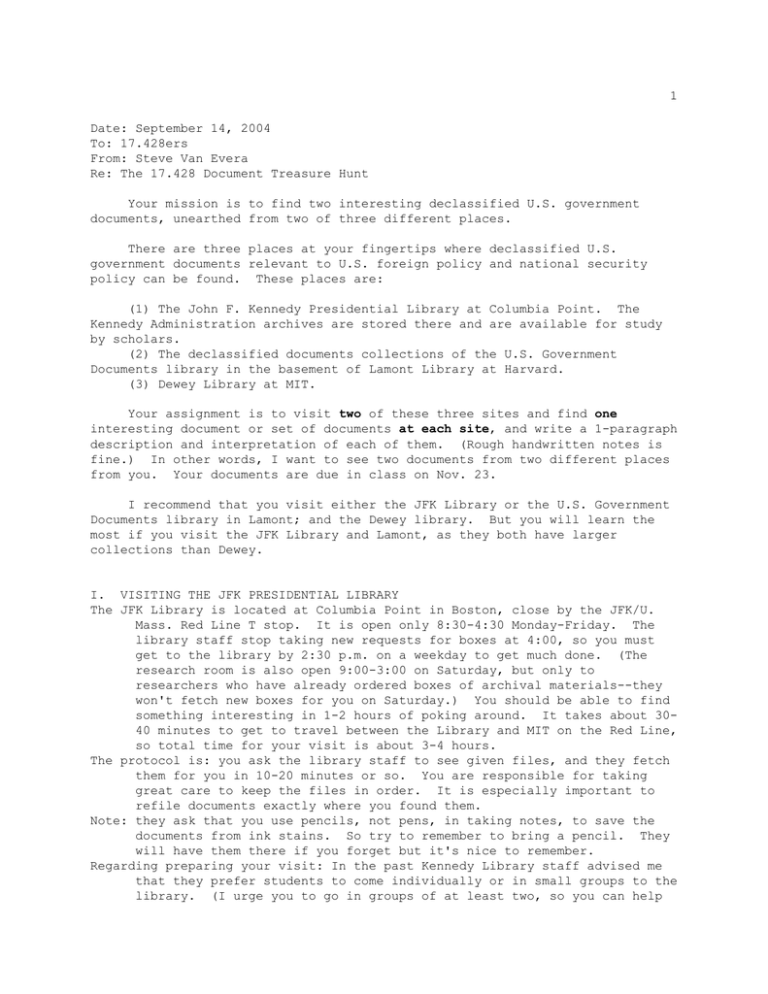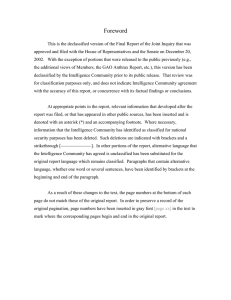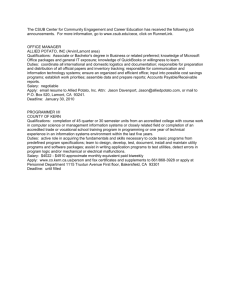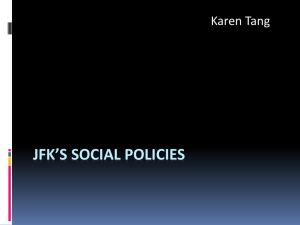Document 13670776
advertisement

1 Date: September 14, 2004 To: 17.428ers From: Steve Van Evera Re: The 17.428 Document Treasure Hunt Your mission is to find two interesting declassified U.S. government documents, unearthed from two of three different places. There are three places at your fingertips where declassified U.S. government documents relevant to U.S. foreign policy and national security policy can be found. These places are: (1) The John F. Kennedy Presidential Library at Columbia Point. The Kennedy Administration archives are stored there and are available for study by scholars. (2) The declassified documents collections of the U.S. Government Documents library in the basement of Lamont Library at Harvard. (3) Dewey Library at MIT. Your assignment is to visit two of these three sites and find one interesting document or set of documents at each site, and write a 1-paragraph description and interpretation of each of them. (Rough handwritten notes is fine.) In other words, I want to see two documents from two different places from you. Your documents are due in class on Nov. 23. I recommend that you visit either the JFK Library or the U.S. Government Documents library in Lamont; and the Dewey library. But you will learn the most if you visit the JFK Library and Lamont, as they both have larger collections than Dewey. I. VISITING THE JFK PRESIDENTIAL LIBRARY The JFK Library is located at Columbia Point in Boston, close by the JFK/U. Mass. Red Line T stop. It is open only 8:30-4:30 Monday-Friday. The library staff stop taking new requests for boxes at 4:00, so you must get to the library by 2:30 p.m. on a weekday to get much done. (The research room is also open 9:00-3:00 on Saturday, but only to researchers who have already ordered boxes of archival materials--they won't fetch new boxes for you on Saturday.) You should be able to find something interesting in 1-2 hours of poking around. It takes about 3040 minutes to get to travel between the Library and MIT on the Red Line, so total time for your visit is about 3-4 hours. The protocol is: you ask the library staff to see given files, and they fetch them for you in 10-20 minutes or so. You are responsible for taking great care to keep the files in order. It is especially important to refile documents exactly where you found them. Note: they ask that you use pencils, not pens, in taking notes, to save the documents from ink stains. So try to remember to bring a pencil. They will have them there if you forget but it's nice to remember. Regarding preparing your visit: In the past Kennedy Library staff advised me that they prefer students to come individually or in small groups to the library. (I urge you to go in groups of at least two, so you can help 2 each other navigate.) They want you to have topics chosen before they arrive; and they want you to give the staff a phone call a day in advance, letting them know you are coming. So call the archives reading room front desk the day before you go and let them know you are coming. And call the archivist if you need help of some kind. Regarding getting to the JFK library: Take the Red Line from Kendall Square inbound a few (5 or 6) stops. Get off at the JFK/U. Mass. stop. At the JFK/U. Mass. T station find a free shuttle bus to the Library. Shuttle busses run every 20 minutes between 9:00 a.m. and 5:00 p.m. At the library ask for the archives Research Room. Regarding working in the Library: A.Identify open files (i.e., files that are already declassified) that you want to look at. To identify these files, consult finding aids. They are organized by collection. The two key collections for foreign policy/military policy are: 1.The President's office files, kept by Evelyn Lincoln. The finding aid for these files are found: (1) in a loose leaf notebook in the research room; and (2) on line, at http://www.jfklibrary.org/f_aids2.htm. 2.The National Security files, kept by MacGeorge Bundy. Includes NSC meeting memoranda. The finding aid for these files is found in a loose leaf notebook in the research room--boxes are listed there. File contents are in card catalogue in research room. Check these to see if boxes contain anything. If the box has no card, this means there's nothing in the box. And you can also find this finding aid (2) on line, at http://www.jfklibrary.org/f_aids2.htm. If you want to look at the President's office files or the National Security files (and you will) you are probably wise to check the finding aids on line before you visit the library to identify boxes you want to see. 3.Many other finding aids are in reading room too. And: If in the future for some reason you want to see hard copies of any finding aids and can't get to the library, they are also available through inter-library loan. B.Then file an application for a box. Put finding aid loose leaf title in application; plus box #. The Library staff will bring it to you in 10-20 minutes. Total JFK library holdings: about 32,000,000 pieces of paper. Of which, perhaps 1,000,000 foreign policy; of which perhaps 800,000 are classified I've been told--don't quote me. For this exercise I'm not asking you to pursue declassification of a document, but if you do serious archival work you will probably pursue declassifications. To get documents declassified is a long (maybe a year-long) but sometimes rewarding process. There are two types of declassification processes: mandatory review and FOIA. Mandatory review applies to files that are not government property, which is most of the Kennedy library contents. If you do further research in the JKF Library you should also be aware that the Library compiles Research Guides for outside scholars on topics about which they care. Has one already been made up on your topic? 3 E.g. Cuba, Bay of Pigs, Latin America. If so, see it. Also useful if you do further research at the Library: Mandatory Review Action records. These list documents that have been declassified, or exempted (refused to declassify), or sanitized (partially declassified.) I may hand out a few readings in class to help you come up with topics to report to give the JFK Library staff and to pursue at the library. These are, specifically, some readings from Arthur Schlesinger, A Thousand Days, and from William Blum, Killing Hope: U.S. Military and CIA Interventions Since World War II (Monroe, Maine: Common Courage Press, 1995). These readings bear on various events and subjects from the Kennedy Administration. You could, for example, pick your favorite among these episodes, read what Blum or Schlesinger said about it, and ask if the archives corroborate or refute their accounts. Specific topics suggested by these readings include: 1.Dominican Republic transitions: May 30 1961 (Trujillo assassinated); November 1961 (Trujillo "wicked uncles" depart DR under US pressure); election of Juan Bosch, then his overthrow in July 1963. (See Blum, Killing Hope, pp. 195-201.) 2.Berlin crisis, 1961--did US officials fear war? If so, why? Berlin crisis 1962-1963--did important US-Soviet discussions about Berlin occur during 1962-1963? What was said? Was anything agreed? 3.U.S. reaction to Khrushchev's January 6, 1961 speech on movements of national liberation. (See Schlesinger, Thousand Days, pp. 282284.) 4.Missile Gap, 1961 (was it believed? When did administration officials stop believing it, and why?); US ICBM buildup, 1961 (why was it done?) 5.Vienna Summit, 1961. 6.Aftermath of Cuban Missile Crisis; post-hoc assessments of it by administration officials. What did they believe were the causes of the crisis? 7.Quadros resignation, Goulart accession in Brazil, August 1961; subsequent US-Goulart relations. (See Blum, Killing Hope, pp. 181-189.) 8.Guatemala: the March 1963 Peralta coup against Ydigoras, later US-Guatemalan relations. (See Blum, Killing Hope, pp. 260-263.) 9.U.S. reaction to Berlin Wall, 1961. (See Schlesinger, Thousand Days, pp. 366-376.) II. VISITING THE U.S. GOVERNMENT DOCUMENTS LIBRARY AT HARVARD'S LAMONT LIBRARY The U.S. Government Documents Library is located in the basement of Harvard's Lamont Library. It's hours are: Monday-Thursday: 9 a.m.-11:45 p.m. Friday: 9 a.m.-4:45 p.m. Saturday: 10 a.m.-4:45 p.m. Sunday: 1 p.m.-11:45 p.m. Regarding getting to the U.S. Government Documents Library: 1.Get on the MBTA red line at Kendall Square. Go 2 stops west to Harvard Square. 2.Make your way to Lamont Library (next to Widener) and enter. If you don't have a Harvard library card, tell them you want to use the Government Documents library. They have to admit you; all government documents libraries are open to the public. 4 3.Go down 2 floors to Level 1 in Lamont, finding there the U.S. government documents library. Regarding finding materials: I recommend that you focus on the "Declassified Documents" collection. This collection is divided into two parts: documents declassified before 1974, and documents declassified since 1975. An index for the whole collection is on CD ROM Doc J83.A1 D425x, found on Level 1. Hard-copy indexes for the pre-1975 documents are also found at Index Microfische S 89 and Index Microfiche S 90 on Level 1. Ask the reference librarian for help if things are confusing. (The library used to keep a convenient hard-copy catalogue for this collection, but I no longer see it listed in the library sources list.) 1.Look through the catalogue for documents declassified after 1985 or so to find a topic of interest to you (nuclear weapons; Cuba; star wars; Berlin crisis; missile gap; Guatemala; Afghanistan; anything). This catalogue indexes 3,000-4,000 newly declassified documents every year, many juicy. The documents themselves are on microfiche in the library sub-basement. 2.Make notes of the fiche numbers of the interesting documents and the year of the catalogue you are looking at. 3.Go down 2 flights to the dark bowels of the sub-basement section of the government documents library. It's dark and spooky but don't be scared. 4.Find there microfiche files, section S, which will contain the fiche you want. YOU WILL HAVE TO ASK A LIBRARIAN DOWN THERE HOW THE FICHE ARE CATALOGUED--IT'S CONFUSING. 5.Take your fiche (take a few, more than one) back upstairs to a fiche reader and have a look. The fiche readers will make copies for you (for a fee); you might make copies of the juiciest documents you find. NOTE: IT IS BEST TO RUN YOUR TREASURE HUNT (a) TOGETHER IN A PACK (b) AVOIDING THE HOURS 1-4 P.M., WHEN ALL THE FICHE READERS ARE OFTEN FULL. Note: MIT's Dewey Library also has a subscription to this collection, but I'm not sure they have the full collection. Perhaps one of you could find out for me. Alternately, should you wish, you can explore the documents collection from the National Security Archive. Many of these can be found on line at http://www2.gwu.edu/~nsarchiv/. This on-line documents collection has the large advantage of being keyword and subject-searchable. It overlaps with the Foreign Relations of the United States (FRUS) series, but also has many documents omitted from FRUS, and those documents that overlap the FRUS series are often more complete, i.e., have fewer excisions. Lamont has an index to this National Security Archives collection (CD-ROM Doc E183.7 N37) and has many of its documents on Microfiche. Note: you can access the National Security Archive from your home computer! But at last check you can't access the Archive's searchable digital database from home--you need to go through a library with a subscription, either Lamont or Dewey (see below). One smart move: Check out the archive at http://www2.gwu.edu/~nsarchiv/ from home, then go to Lamont or Dewey to explore the digital version more deeply. The following topics and many more are in the National Security Archive collection: 5 Afghanistan: the making of U.S. policy, 1973-1990. The Berlin Crisis, 1958-62. The Cuban Missile Crisis, 1962. El Salvador: the making of U.S. policy, 1977-1984. Iran: the making of U.S. policy, 1977-1980. Iran: Mohammad Mossaddeq and the 1953 Coup in Iran. The Iran-Contra Affair: the making of a scandal, 1983-1988. The U.S. Intelligence Community: organization, operation and management, 19471989. U.S. Military Uses of Space, 1945-1991. Nicaragua: the making of U.S. policy, 1978-1990. U.S. Nuclear Non-Proliferation policy, 1945-1991. The Philippines: U.S. policy during the Marcos years, 1965-1980. South Africa: the making of U.S. policy, 1962-1989. The U.S. and the Argentine "Dirty War" of the 1970s. The 1973 "October War" and U.S. policy. Kennedy and Castro. The Creation of SIOP-62. U.S. Planning for War in Europe, 1963-64. Why There Was No Crackdown on the Revolutions of 1989: New Documents from Soviet/East European archives. Brazil Marks 40th anniversary of Military Coup: Declassified Documents Shed Light on U.S. Role. As noted above, MIT's Dewey Library also has a subscription to the searchable digital National Security Archive collection that you can use. Alternately, should you wish, you can explore the declassified documents collections listed in the UPA Research Collection 1991 catalogue. At last visit this was kept behind the reference librarian's desk in the Lamont (Harvard) government documents library. These collections are all on microfilm (more of a pain to deal with). The microfilms are also kept in the gov docs subbasement, in the "Microfilm Cage," rows 89 and 90. They include, e.g., "President Dwight D. Eisenhower's Office Files, 1953-1961" (Call #: Film A575.3); "The Lyndon B. Johnson National Security Files 1963-1969" (Call #: Film A656.5.1); "The Diaries of D.D. Eisenhower 1953-1961" (Call #: Film A643); "Confidential U.S. State Department Central Files: Germany: Internal Affairs 1930-1941" (Call #: Film A575.18); and many many more. However, these files tend to be less juicy than files referenced in the Declassified Documents Catalogue. Alternately, you can explore the records of the Joint Chiefs of Staff, 19421953, on microfilm at Film A 367 and Film A 368. Alternately, you can explore the records of the National Security Council. Ask the reference librarian where they are, or consult my handout finding aid for the library, which lists their locations. Alternately (an option for wimps) you can check out the Foreign Relations of the United States, the official published declassified documents collection of the U.S. government. Now publishing declassified documents up to the late 1960s. At US Doc 1120.5 in the sub-basement; ask the reference librarian where it is if you can't find it. This collection is excellent; the option is for wimps because interesting documents are easy to find in it. Be aware that equivalent British, French, and German published declassified document collections also exist, but I'm not sure if GovDocs has them. 6 Note: full text of selected volumes from the FRUS are also available on line at www.state.gov/www/about_state/history/index.html. And hard copies are also found at MIT's Dewey library. What to do next: Head out of Lamont, go across the street to Mr. Bartley's Burger Cottage, and treat yourself to a Rubenberger. Or a Ted Kennedy ("a plump, liberal portion"). You deserve it. Many impressive works of history that appear to have been researched in the presidential or national archives were in fact researched using these collections, far from any archive building.1 Time for your Adventure in Lamont: 3 hours. III. VISITING DEWEY LIBRARY MIT's Dewey Library is known and beloved by you all. It has three collections of declassified U.S. Foreign Policy Documents. All are also found in the U.S. Governments Document Library in Lamont. 1.U.S. Declassified Documents. 2.Documents of the NSC 1947-1977. 3.Digital National Security Archive. You can access this collection at Dewey, or from your home computer. 1 For example, Marc Trachtenberg, "A 'Wasting Asset': American Strategy and the Shifting Nuclear Balance, 1949-1954," International Security, Vol. 13, No. 3 (Winter 1988/89)--filled with cites to faraway presidential and national archives, but researched right here in the Lamont/Widener govdocs collection. Be aware that the Government Documents library also has the National Inventory of Document Sources, something that you can use to do remote research at faraway U.S. archives without going there. Ask the reference librarian for it. It lists the contents of the presidential libraries around the USA, and of the National Archives. Use it to ask for withdrawal sheet records at these far away libraries; then ask for mandatory review of the unreleased documents, and copies of those released. These can be ordered by credit card.


